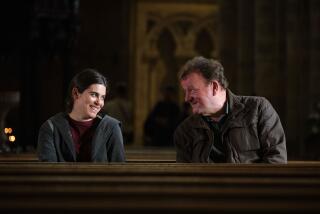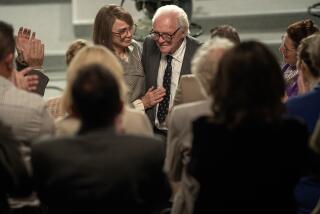‘The Aftermath’ explores compassion for the enemy in the wake of WWII
In 1946, after World War II had finally come to a close, the German city of Hamburg was in ruins. Over 100,000 citizens had been killed during the air raids and, in the months following the war, millions of people were homeless and without food. The British government occupied Hamburg, its officers requisitioning the grand homes throughout the city and evicting the inhabitants.
This is the setting for “The Aftermath,” a new film now in theaters from director James Kent that centers on the idea of compassion for an enemy. It’s a period of history not normally depicted on-screen, but for all involved the moment of reconciliation in Europe resonates strongly today.
“There were two things I just adored about the story,” says Kent, who previously tackled a lesser known aspect of World War I in 2014’s “Testament of Youth.” “The first was that it’s a universal story of compassion and forgiveness. ... The second was this incredible moment in history, which speaks so loudly to us now.
“It had been a moment of great anger and conflict and devastation, but actually what we’re focusing on is the moment of great unity and generosity and efforts to try and help this nation get back on its feet. In this world we’re now in, which I think has become more nationalistic, it’s great to remember just how it was at a time when we could have been really vengeful.”
The resonance of the story may come from the fact that it’s based in truth. Novelist and screenwriter Rhidian Brook took the idea from his own grandfather’s history. When Col. Walter Brook, an English officer, went to Hamburg, he refused to evict the German family living in the house he requisitioned. Instead, he shared the home with his former enemy for five years, a gestured that inspired Brook.
The concept was sold to Ridley Scott’s Scott Free at the same time Brook scored a book deal, so he worked on the screenplay and the novel simultaneously. When the novel version of “The Aftermath” was released worldwide in 2013, Brook requested that Scott Free bring in new eyes to look at the screenplay. Joe Shrapnel and Anna Waterhouse came onboard, followed by Kent, but the film really took on life when Keira Knightley was cast in the lead role of Rachel Morgan, the wife of a British officer who comes to live with him in a German home in Hamburg after the war.
“I’ve done various films set in the Second World War, but I’d never seen anything dealing with this specific period,” says Knightley, who felt an immediate interest in the script. “It just made me realize I’d never even thought about it. And you think about that in terms of ‘OK, the English and the Germans had been killing each other for six years and the propaganda had been demonizing the other so that they could kill each other for six years. How do you see and come to terms with each other as human beings after that?’ That’s a question, even now, we can’t fully answer. How do you physically rebuild these cities, but also how on earth do you forgive? How on earth do you move forward?”
The film, which differs slightly from the novel, is largely about Rachel’s journey as she arrives in Hamburg to join her husband, Col. Lewis Morgan (Jason Clarke). She finds him in a requisitioned house previously owned by an architect named Stephan Lubert (Alexander Skarsgard), who remains living in the attic with his daughter.
Rachel, who lost her child during the bombings in England, is hardened against the Germans, seeing the entire country of people as only an enemy. As she and Lewis struggle to rebuild their marriage, she finds common ground with Stephan, a man also caught up in post-war grief. Rachel learns, throughout the film, that empathy for the other is essential to our survival, an idea far grander than the story’s specific characters.
“I’ve read a lot of World War II scripts, and I feel it’s often from a British or American point of view,” Skarsgard says. “And Germans are portrayed, 99 percent of the time, as evil Nazis. The moral compass is completely straight. In reading the script and Rhidian’s novel, it was so interesting to see this character who is not an active member of the Nazi party, but he’s also not a hero. He’s been compromised. He’s guilt-ridden. [I loved] the idea of animosity of the two sides and how through acknowledging the pain in the other person, the person you’re trying to loathe, you can connect and feel your own pain and slowly mend each other’s heart.”
“Its relevancy to today is probably why it really stirred something in me,” Knightley adds. “Because of course that’s what we have all over the world today — ‘they don’t look the same and they don’t sound the same and therefore they’re the enemy.’ People are dehumanized. Our rhetoric right now is very much part of that. But what that [WWII] generation proved was that there was life and a lot of positivity after that, after a great, horrific trauma. How extraordinary that human beings actually managed to get over that. That we have the potential to get over that, even though it’s not easy.”
“There’s empathy in recognizing yourself in others,” adds Clarke, who read extensively in preparation for the film after accepting the role of Lewis. “It’s not that we’re different. It’s that ‘I am you.’ There’s the idea that after so much destruction, do you want to destroy more or do you want to rebuild?”
For Kent, who studied history in school, the importance of retelling moments from our past is in identifying how little has actually changed over the years. He sees “The Aftermath” as less of a love story and more of a tale of compassion, affirming that humans in any time period have the potential to connect after a conflict or tragedy.
“The past is beautiful to watch, but I think if it’s well done it should have universal truths,” the director says. “It’s important to realize we’re not so different from our forebears because then you realize we can keep making the same mistakes as our forebears if we’re not careful. And actually this film is a warning from history about working as individuals towards reconciliation. We shouldn’t leave it to our masters and our governments; we need to do it as individual people.”
The undercurrent of “The Aftermath” is the formation of the European Union, created after World War II and now threatened by the U.K.’s impending withdrawal March 29. When Brook wrote the story, he wasn’t thinking about Brexit since it didn’t exist yet, but he acknowledges that the film has taken on a new significance by coming out in 2019.
“The film isn’t didactic about one thing or the other,” Brook says. “It just happens to show a moment in time, and that moment was a time when Europe had a choice about how it was going to go about things. The choice then was not for revenge or occupation forever; it was to give the people their freedom so they can rebuild their lives. The EU was formed out of that. It was born of ‘We will never fight like this again.’ ”
The parallels exist in multitude, depending on where you’re coming from when you view the film. For some, it may evoke the split of Brexit. For others, it may bring up the other-izing rhetoric of the wall in the U.S. In many ways, “The Aftermath” is about making a decision to understand someone who is not like you instead of creating a division. That theme resonated deeply with the actors, who have continued to consider the story long after they finished filming.
“I obviously do a lot of period films, but the thing I tap into, as somebody who does actually live in 2019, is ‘How do I find this relevant?’ ” Knightley says. “Sometimes it’s escapism, but mostly it’s tapping into something I think is still happening or I still feel. And this one — where we’re at a point where everyone is trying to build walls and break things apart — it’s interesting to see a film about people trying to put things back together again and how difficult that is once it’s all been broken apart. We forget that. We talk about victories. We talk about beating people, but you don’t talk about the consequences of those actions.”
“What’s more extreme than a German and a Brit six months after the war?” Skarsgard adds. “If they can find each other and find a way to understand the other side, damn it if we can’t.”
More to Read
Only good movies
Get the Indie Focus newsletter, Mark Olsen's weekly guide to the world of cinema.
You may occasionally receive promotional content from the Los Angeles Times.






